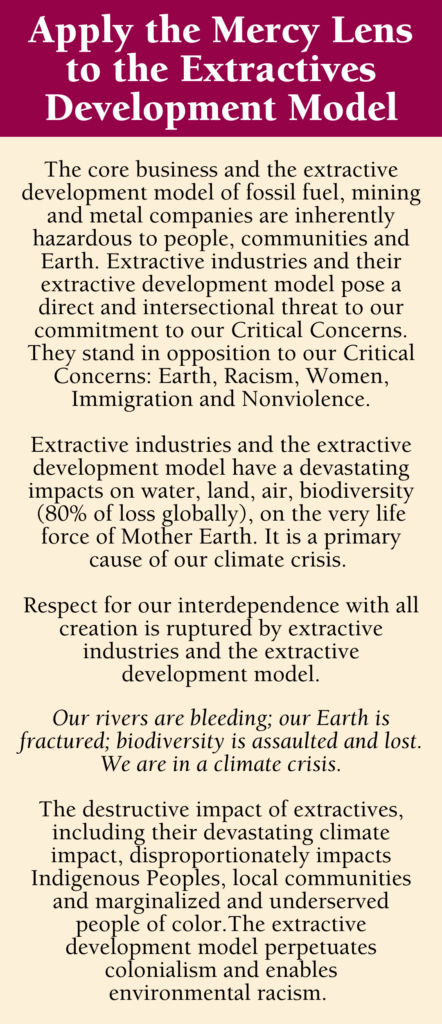
Background
The Institute of the Sisters of Mercy of the Americas embraces the tradition of Catherine McAuley. We have been shaped by her vision and her living of the Gospel and by her commitment to walk with the economically poor. Following in her footsteps, we vow to be of service to persons who are made poor, persons who are sick and persons who are uneducated. We have continued to deepen our Mercy tradition in these contemporary times. In the course of our last three Institute Chapters (2005, 2011 and 2017), we intensified our desire to live in solidarity with our suffering world and with all of God’s creation. We continually seek to transform ourselves toward greater integrity of word and deed.
“The God of Mercy, Wisdom and Mystery is calling us, as Sisters of Mercy of the Americas, an international and intercultural community, to deepen our relationship with God and one another, and to intensify our work in communion with others who seek a more just and inclusive world.”
Chapter 2017 Recommitment: Called to New Consciousness
Through an expressed commitment to our Critical Concerns, we give special attention to five interrelated areas of need in our suffering world—Earth, Immigration, Nonviolence, Racism and Women. We understand that our commitment to these Critical Concerns must be considered within a broader context and in relation to one another. (Click here for more on the Critical Concerns.)
Call to a New Consciousness

During the 2017 Institute Chapter, we deepened our commitment to listen to the cries of people, communities and Earth most deeply impacted by extractive industries. We committed to respond with “integrity and clear intention” to their demand for justice and the flourishing of life for all.
As Mercy, we are called to consider more profoundly our responsibilities to Mother Earth. We seek to live in harmony and interrelatedness with Earth and to support the right of the Earth and her inter-related communities to fulfill their important roles in the ever-renewing processes of life (Berry 1999). The “demand to embrace our Critical Concerns through the lens of nonviolence” compels us to listen to people, communities and Earth—who have been brutally impacted by extractive industries.
As Mercy, we are called to listen to the communities of color and indigenous communities—those who continue to be disproportionately and violently impacted by extractive industries. We must actively work in becoming an anti-racist community and to address our climate emergency. It requires a recentering of the stories and experiences that drive our decision-making. We ask what it means today for Mercy to stand in solidarity with communities harmed by extractive industries and to address their exploitative systems and to be part of the solution to avoid the worst impacts of our climate emergency.
“Called in this moment to act,” we are compelled to respond to the impact of extractive industries on people, communities and Earth. By committing ourselves to a decentered way of listening, seeing and making decisions, we engage in decolonized analyses of the exploitative extractive development model and our own structures and practices that enable extractive industries. We seek right relationship and harmony with the community of life, in which we strive to embrace a reciprocal, cooperative and non-dominant relationship with all of God’s kindom.
“We hear the call of our suffering world. The impoverishment of peoples, the devastation of Earth and oppressive social norms and systems call us at this moment to act…To intensify our efforts to align our investments with our values and especially now, to pursue education and action against practices of extractive industries that are destroying people communities and Earth.”
Chapter 2017 Recommitment statement
Key Points in Using a Mercy Lens:
- We serve the suffering of our world with a special commitment to our Critical Concerns.
- We work toward transformation of greater integrity in word and deed.
- We exercise a preferential option for and listen to the cries of communities, especially communities of color, Indigenous Peoples and the marginalized, demanding justice from where they stand and in their own experience.
- We seek right relationship and harmony with Earth’s community of life through reciprocal, cooperative and non-dominant relationships.
- We listen to the stories and experiences of others from a decentralized and decolonized place.
- We caution against the imbalance and destructive forces perpetrated by the dominance of the powerful, privileged, white, patriarchal, and capitalistic/imperialistic perspective.
- We continue to ask questions to get to the deepest root causes of the suffering of people and Earth.
Questions:
- What stays with you from this description of the Mercy lens?
- Is there a concept or element in the description that you need clarified? If so, what?
- What is the key word that speaks most to you about using a Mercy lens to analyze the impact of extractivism on peoples, communities and Earth?
- How do we get to the decolonized and decentralized place referenced? What, if anything, looks different there from how most of your time and energy are spent? What are the opportunities you find with this approach? And the challenges?
- How have you seen the use of the Mercy lens to uncover the root causes that impact action or decision making for yourself or Mercy as a community?